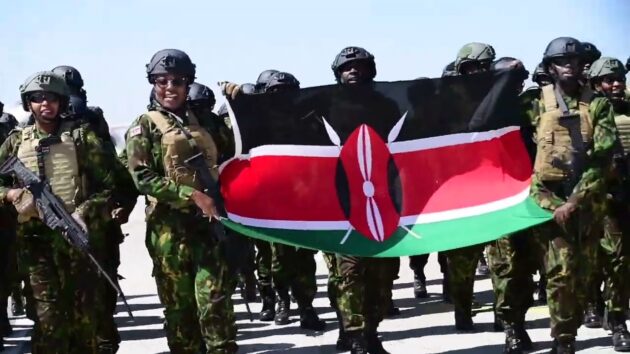
NAIROBI, Kenya, Sep 30 – The United Nations Security Council (UNSC) is set to vote Tuesday on a resolution that could transform the Kenyan-led Multinational Security Support (MSS) mission in Haiti into a larger and more robust Gang Suppression Force (GSF).
The MSS mandate expires on October 2.
The vote comes less than a year after China and Russia blocked a similar proposal to upgrade the MSS into a full UN peacekeeping mission.
At the time, Beijing argued that “there is no peace to keep,” while Moscow accused Washington of external interference and warned against “hasty decisions.”
Both countries are expected to closely scrutinize the GSF proposal, raising questions over whether they might once again exercise their veto power.
The resolution, co-sponsored by the United States and Panama, seeks a new Chapter VII mandate that would authorize the deployment of more than 5,500 personnel—over five times the size of the current MSS.
The GSF would be tasked with proactive anti-gang operations, securing vital infrastructure, and restoring state control in territories dominated by armed groups.
Escalating gang violence
Speaking during a high-level event on the sidelines of the UN General Assembly on September 22, US Deputy Secretary of State Christopher Landau warned that Haiti’s escalating gang violence posed a direct threat to regional stability.
“The time for action is now,” Landau said. “Despite overwhelming support of the Security Council, there are still those who might try to prevent its adoption or slow our response in Haiti’s hour of need.”
He stressed that Haiti’s transitional government fully supports the plan, noting that all 32 members of the Organization of American States (OAS) have signed a joint statement urging swift approval.
Washington also announced fresh sanctions against two former Haitian lawmakers accused of corruption, while making clear it expects greater burden-sharing.
“The United States cannot continue to bear the lion’s share of the financial burden,” Landau said.
‘Correcting mistakes’
Kenya has spearheaded the MSS since October 2023, with 735 police officers forming the backbone of a multinational contingent now totaling 989 personnel.
Other contributors include Guatemala, El Salvador, Jamaica, the Bahamas, and Canada.
President William Ruto highlighted the mission’s gains—including reopening Port-au-Prince’s airport, securing the presidential palace, and restoring police training facilities—but admitted the MSS has been operating at only 40 percent capacity due to inadequate resources.
“The situation in Haiti today is indefensible and simply wrong,” Ruto said. “If we don’t correct the mistakes of the past, we will most unlikely succeed.”
He criticized the international community for failing to honor pledges, citing delays in troop deployment, shortages of armored vehicles, and unreliable equipment.
“Many vehicles broke down in dangerous places, putting our personnel in great danger,” he revealed.
Ruto insisted that any successor mission must have a clear mandate, predictable resources, and reliable logistics, warning that fragile gains risk being reversed without decisive international action.
Haiti’s Transitional Presidential Council President Laurent Saint thanked Kenya, the US, and other partners, but said his country cannot defeat the gangs without expanded international support.
“Today, 12 million men, women, and children depend on the solidarity of the international community,” Saint said. “There is no longer time for promises. It is time for urgent, decisive, and collective action.”
If approved, the GSF would represent the most ambitious international effort yet to reverse Haiti’s descent into gang rule.





